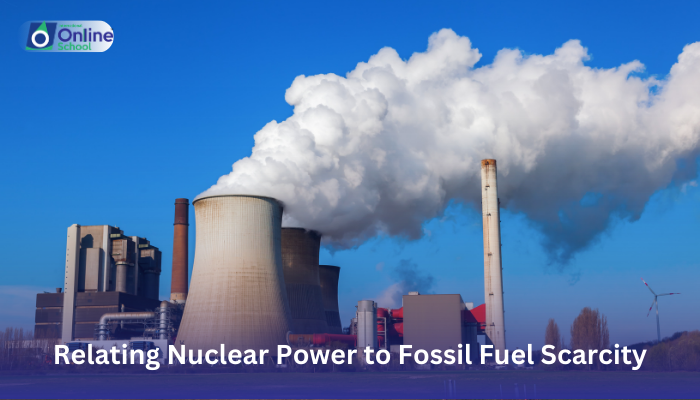
Learning Outcomes:
i. Define and explain the concept of fossil fuel scarcity and its potential impact on energy security.
ii. Explore nuclear power as an alternative energy source and its advantages and disadvantages in relation to fossil fuels.
iii. Evaluate the role of nuclear power in addressing global energy demands and promoting sustainable energy solutions.
Introduction:
Imagine a world where the familiar hum of machines powered by oil and gas fades into silence. This isn't a futuristic sci-fi scenario; it's a potential reality if we continue to rely heavily on fossil fuels, resources that are finite and facing depletion. Today, we delve into the intricate relationship between fossil fuel scarcity and the potential rise of nuclear power, exploring the challenges and opportunities this shift might present as we seek to illuminate the path towards a sustainable energy future.
i. The Looming Shadow of Scarcity:
Fossil fuels, like coal, oil, and natural gas, have fueled our modern world for centuries. However, their reserves are not infinite. Years of extraction and consumption have left us facing a looming challenge – fossil fuel scarcity. This scarcity manifests in several ways:
Depleting reserves: As we extract more, the readily available resources dwindle, leading to higher extraction costs and environmental damage.
Price volatility: Geopolitical instability and limited supply can cause dramatic fluctuations in fossil fuel prices, impacting energy security and economic stability.
Environmental consequences: Burning fossil fuels releases greenhouse gases, contributing to climate change and its devastating effects.
ii. Nuclear Power: A Glowing Alternative?
In the face of fossil fuel scarcity, nuclear power emerges as a potential alternative. Harnessing the energy released from splitting atoms, nuclear power plants generate electricity with minimal carbon emissions. This presents several advantages:
Energy independence: Nuclear fuel is relatively abundant and geographically dispersed, reducing dependence on foreign oil and gas supplies.
Reduced greenhouse gases: Nuclear power doesn't contribute significantly to climate change, unlike fossil fuels.
High energy output: Nuclear power plants can generate large amounts of electricity from relatively small amounts of fuel.
However, nuclear power also comes with its own set of challenges:
Safety concerns: Accidents at nuclear power plants, like Chernobyl and Fukushima, raise concerns about safety and radioactive waste disposal.
Proliferation risks: Nuclear technology can be misused for weapons production, raising security concerns.
High initial costs: Building and maintaining nuclear power plants can be expensive.
iii. Weighing the Scales: A Balanced Perspective:
The debate surrounding nuclear power is complex, with compelling arguments on both sides. While it offers a potential solution to fossil fuel scarcity and its environmental consequences, safety concerns and technological challenges remain. Therefore, a balanced perspective is crucial:
Nuclear power can be part of the solution, but not the sole answer: A diverse energy mix that includes renewable sources like solar and wind is essential for long-term energy security and sustainability.
Safety and waste management must be top priorities: Continuous advancements in technology and stringent regulations are necessary to ensure safe operation and responsible waste disposal.
Public awareness and education: Engaging in open and informed dialogue about nuclear power is vital for building public trust and promoting responsible decision-making.
The question of whether nuclear power is the answer to fossil fuel scarcity doesn't have a simple yes or no response. It's a complex puzzle with pieces of advantages, disadvantages, and ethical considerations. As we navigate the twilight of fossil fuels, it's crucial to remain informed, engage in thoughtful debate, and prioritize sustainable solutions that ensure a brighter energy future for generations to come. Remember, the power to shape our energy landscape lies not just with technology, but with our collective choices and responsible action.